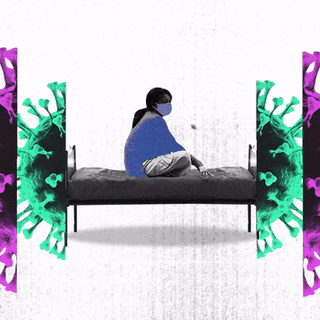
New Study Shows Antidepressants May Not Improve Quality of Life for All
We may need to rethink how they’re prescribed, and for whom.

A churn is underway in the world of pharmaceuticals; research is increasingly at odds with what seems to be tried and tested wisdom. Antidepressants lie at the frontier of this tussle — while they can and have been life-saving for many with mental health conditions, research over the past few years has pointed to a need to re-evaluate how they are prescribed.
A new study supports the narrative that the interventions may not be the magic happy pill that many rely on them. Published last week in PLOS One, the analysis showed that for many patients, improvements in health-related quality of life (HRQoL) were more short-term than they seemed. In many instances, there wasn’t a significant difference in HRQoL between a cohort taking the medication and one that wasn’t as per the research.
At the outset, a limitation of the study was that it did not differentiate between people who had been on treatment for a long time, compared with newly-diagnosed patients. Still, the research supports growing evidence of a publishing bias with respect to antidepressants. The influence of pharmaceutical industries, the trend seems to be, undermines research on their efficacy and side effects. Amid the rise in the prescription of antidepressants, the research gives us pause in how we approach mental health care overall.
“Selective reporting of clinical trial results may have adverse consequences for researchers, study participants, health care professionals, and patients,” notes an analysis, published in the New England Journal of Medicine which reviewed studies about 12 antidepressants conducted by the Food and Drug Administration (FDA) in the United States.
The researchers found that nearly all the studies that showed positive outcomes pertaining to the drugs were published. At the same time, almost none — barring three — of the studies with negative or questionable results were published (and if they were, the results were framed in a positive light). This meant that as per published papers, 91% of trials associated with antidepressants were positive — but when all the research is taken in its entirety, this number drops to 51%.
“There can be many reasons why the results of a study are not published, and we do not know the reasons for nonpublication… We wish to clarify that nonsignificance in a single trial does not necessarily indicate lack of efficacy,” the study went on to note.
Related on The Swaddle:
Antidepressants Are ‘Notoriously Difficult to Quit’: Research
The growing consensus seems to point toward a more hollistic approach rather than relying almost solely on prescription medication. Another review last year suggested that we should be prescribing fewer antidepressants — especially for patients with mild depression — and concentrating more on patients with more severe cases. The review pointed out that in most clinical trials, only a short period is taken into account — whereas patients are prescribed medication for years. Weighing the costs of long-term usage against the benefits then becomes a challenge.
Moreover, clinical trials also don’t look at the quality of life as a factor — only symptoms. That’s where the present study comes in: it shows how while there may be an improvement in the mental aspects of quality of life, many physical aspects remain poor. These include “physical health problems, bodily pain, general health, and vitality (energy/fatigue)” and also, withdrawal symptoms.
“Future studies should not focus on the use of pharmacotherapy only, it should rather investigate the long-term impact of pharmacological and non-pharmacological interventions, such as behavioral therapy, psychotherapy, social support sessions, education, or combined interventions, on these patients’ HRQoL,” the study concluded.
“After adjusting for publication bias, psychotherapy was more efficacious than pharmacotherapy,” noted one 2016 meta-analysis. Overall, however, research shows that a combination of psychotherapy and pharmacotherapy yielded the best results, rather than each administered alone.
Overall, the findings prompt greater scrutiny of antidepressants — not to negate their effects, but to improve treatment outcomes by changing how they are prescribed.
Rohitha Naraharisetty is a Senior Associate Editor at The Swaddle. She writes about the intersection of gender, caste, social movements, and pop culture. She can be found on Instagram at @rohitha_97 or on Twitter at @romimacaronii.
Related


How the Covid19 Pandemic Worsened Tuberculosis Care for Women
